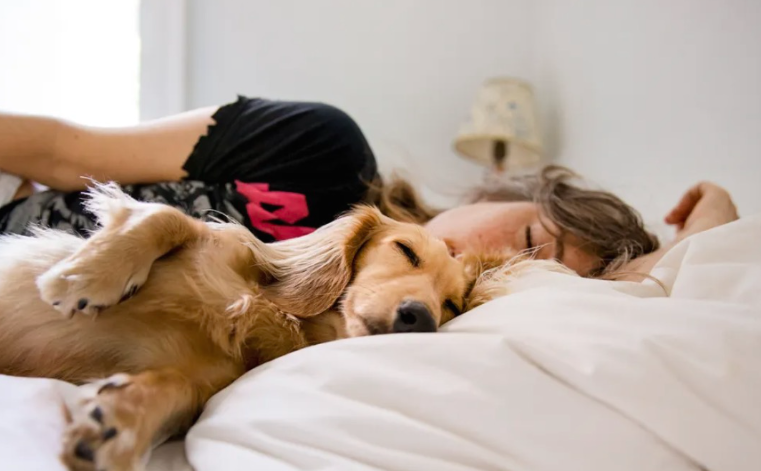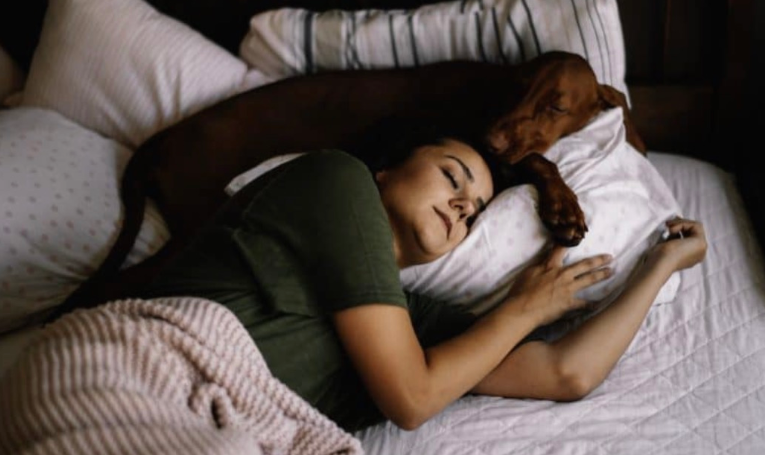
Undoubtedly, the importance of a good night’s sleep for overall health is widely acknowledged. With numerous studies exploring the optimal ways to achieve quality rest, recent research proposes a surprising solution, sharing the bed with dogs. Canisius College in New York State spearheaded this unconventional investigation, revealing that women experience better sleep next to their canine companions compared to human or feline counterparts.
Lead researcher Christy Hoffman, Ph.D., an animal behaviorist, conducted a survey involving nearly a thousand women across the United States to draw these intriguing conclusions. The results unveiled that 55% of participants shared their beds with at least one dog, 31% with a cat, and 57% with a human partner.

Hoffman delved into the reasons behind dogs emerging as superior sleep partners. The study highlighted that dogs’ sleep patterns align more closely with humans than those of cats. Hoffman theorizes that this synchronization may contribute to improved sleep quality, as dogs are adept at accommodating their owners’ sleep schedules, potentially mitigating disruptions caused by differing bedtime routines.
Furthermore, the structured routines imposed by dogs, such as morning walks, assist in regulating their owners’ daily schedules, thereby enhancing overall sleep quality. Another contributing factor is the physical stillness of dogs during sleep, unlike fidgety feline companions. Women in the study reported that dogs tended to remain on the bed throughout the night, fostering a sense of security and stability.
The study’s third crucial finding emphasizes the unique sense of security that dogs provide. Unlike cats or even human partners, dogs offer a heightened level of psychological comfort. Hoffman suggests that the perception of dogs as vigilant protectors, capable of alerting their owners to potential intruders, plays a role in enhancing the sense of security.

Despite these intriguing findings, the study acknowledges the subjectivity of sleep preferences. Factors such as a dog’s snoring or generating excess warmth could pose challenges. Additionally, there are individuals who find solace in the companionship of cats during bedtime.
It’s essential to note that the study relies on participants’ subjective perceptions of their pets’ impact on sleep quality and duration. Consequently, further research is necessary to definitively crown dogs as superior sleeping partners. Hoffman emphasizes the need for continued exploration into the various contexts under which pets positively or negatively influence sleep quality.
As American households increasingly welcome pets, understanding these dynamics becomes crucial. Future research may utilize technologies like Fitbit-like devices to objectively track sleep quality in diverse sleeping conditions, providing a more comprehensive understanding of the intricate relationship between humans and their animal companions during bedtime.
My Husband Insisted I Get Pregnant the Day after Our Wedding — My Heart Dropped When I Discovered His Real Reason

As a child, my grandmother used to tell me that life can be full of surprises, not all of them pleasant.
“Remember the good times and don’t let the bad ones bring you down, Liz,” she’d say.
I suppose she wanted to prepare me for life’s bitter moments, but little did she know that the worst day of my life would alter my reality forever.
I’ll never forget the moment I discovered what my husband, Jake, was scheming behind my back. We met at my workplace and quickly became close friends.
We married after just six months of dating because we felt a deep connection—or so I thought.
The day after our lovely wedding, Jake brought up the idea of starting a family right away. “Liz, I think we should try for a baby immediately,” he said, sounding more urgent than I expected.
“Are you sure? We just got married,” I replied, trying to gauge his intentions.
“Yes, absolutely,” he insisted. “There’s no better time than now. It’s the perfect way to start our journey together.”
Despite his enthusiastic words, something about his tone made me uneasy.
Confused yet flattered by his eagerness, I smiled and nodded, unaware of his true motives.
One day, while tidying up the living room, I noticed Jake’s laptop chiming with a notification. He was in the shower, so I glanced at the screen.
I wasn’t snooping, but I couldn’t ignore the message preview that read, “Is she pregnant yet?”
It was from his ex-girlfriend, Claire.
My stomach churned as I read their chilling conversation.
“Remember our agreement, Jake. You need to impregnate her within a year. Otherwise, you won’t secure your inheritance,” Claire wrote.
“Don’t worry, I’m on it. Everything is going according to plan,” Jake replied.
Tears streamed down my cheeks as I processed their conversation. They discussed a cold, calculated strategy where Jake would marry me to ensure an heir for a substantial inheritance from a distant relative.
To secure the inheritance, Jake needed to father a child within a year of our wedding. Moreover, he was using me because his ex-girlfriend was infertile.
After securing his share, Jake planned to divorce me and be with Claire.
“How could you?” I whispered.
Shaken by the revelation, I knew I couldn’t confront Jake without solid evidence. So, over the next few days, I acted normally while discreetly gathering proof.
Whenever Jake left his laptop unattended, I copied the emails onto a USB drive. I also started recording his phone conversations with Claire whenever I was out.
One evening, pretending to leave the house, I hid in the garage and recorded Jake confirming their scheme on the phone.
“I just need a bit more time, Claire. Trust me, everything’s on track,” he said urgently.
With the evidence secured, I consulted a lawyer.
“This is serious, Elizabeth. We need to handle this carefully to protect you legally and financially,” he advised.
We planned every step meticulously, preparing for the inevitable confrontation.
Jake’s family hosted an annual gathering a few weeks later, providing the perfect opportunity to reveal his truth.
It was attended by all his distant relatives, including those whose inheritance he coveted.
In the weeks leading up to the event, I pretended to be a loving wife eager to start a family with Jake. But inside, I felt anxious.
During the event, I stood up to make a toast after dinner.
“I want to thank everyone for welcoming me into this wonderful family,” I began. “And to my dear husband, who has taught me so much about trust and love, I have a special surprise!”
As all eyes turned to me, I switched on the projector. The damning emails between Jake and Claire flashed on the screen, followed by recordings of their phone conversations.
The room fell silent. Then, Jake’s grandmother stood up, her face flushed with anger.
“You are a disgrace,” she declared firmly. “You won’t receive a penny of anyone’s wealth!”
Claire, whom I had invited as a friend’s plus one, stood up, her face pale. She slapped Jake across the face.
“I never want to see you again!” she exclaimed before storming out.
As whispers filled the room, I looked at Jake, his face drained of color.
“And one last thing,” I added firmly. “I never intended to get pregnant so soon. I’ve been on birth control since learning the truth.”
That evening, Jake’s plan lay in ruins, leaving him with nothing. His deception also invalidated our prenup.
Meanwhile, I walked away with my integrity intact and a bright future ahead of me.
What would you have done?



Leave a Reply